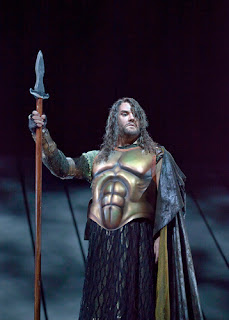 |
| Bryn Terfel as Wotan. |
This is a blow-by blow writeup of the first night of the Met's new Das Rheingold, written as it happened on the Met's live Sirius Radio simulcast.
The Met's new Ring Cycle got off to a good start. The Prelude was played very slowly, with the Met orchestra sinking the listener into Wagner's tone-world. James Levine conducted the difficult opening bars with a sure hand, and the tonal glories extended to the revelation of the Rhinegold and the entry of the Valhalla theme.
Scene I:
As Alberich, Eric Owens is equipped with powerful, guttural tone and a minim of vocal affectation. He was ably flirted with by a trio of flying,floating Rhinemaidens. The new high-tech stage is efficient and silent, its movements inaudible over the broadcast. Whole underwater scene was played very slowly.
Scene II
Bryn Terfel's first, dreamlike notes were unexpectedly sweet. The steel in the great Welshman's voice emerged with his salute to Valhalla, noble and compelling in tone. He is ably matched by Stephanie Blythe as Fricka, who produces warm tone even when giving her husband the third degree about his shady real estate deals.
The Giants enter at ponderous speed. Everything is slow and heavy in this performance, as if Levine wants to give greater weight to the proceedings. But it sounds like the knights in "Parsifal." Fasolt (Franz-Josef Selig) has a pleasant, sonorous voice. with the requisite notes, marred by an audible vibrato. Fafner (Hans-Peter König) is better. Both giants rrrreally rrroll their r's.
Richard Croft's entry as Loge elevates the tone of the entire opera, with the welcome addition of a major tenor part. (Yes, I know Froh sings first, but that's a really small part and I don't know who's playing the God of Light.) Loge's narration holds the listener's interest throughout in a passage where Rheingold sometimes loses its initial steam. Best of all, Terfel floats a soft pianissimo on "Macht und Schätze schüf ohne Mass ein Reif.", managing to sound mysterious and a little bit evil.
Scene III:
OK. Freia carried off. (Nice little oboe solo.) Gods growing old slowly. And then cue the anvils and the big transformation to Nibelheim. This is played with a weight and rhythmic drive that was absent earlier. Eric Owens makes a welcome return to the stage dragging Mime in the person of character tenor Gerhard Siegel. Tarnhelm horns are gorgeous, and appropriately eerie. Lengthy dialogue in Nibelheim is always tough to stay involved in, though Terfel, Owens and Croft are all strong in the face-off.
When Alberich turns himself into a toad (kröte) and then gets stepped on and captured is the dodgiest moment in the Ring. At least the audience laughed. Now, more anvils.
Scene IV:
The second confrontation with Alberich, when he takes the ring is a great face-off. Terfel starts going up the stave, almost shouting as Owens stands his ground. (Now he sounds a LOT evil!) This is Wotan as villain, completely corrupted by his lust for the gold. Terfel sounds like Scarpia here, but this is villainy on a much larger scale. Magnificent. Owens is roaring and grunting in his struggle with Terfel, and screaming in agony as the Ring is taken away.
Here comes the second baritone's big moment: the curse that will hang over the Ring until the final bars of the last opera. (Considering that the Met's Götterdämmerung bows in in 2012, that's a looong curse.) It's delivered with appropriately evil laughter and ultra-slow again--James Levine is giving the singer all the time he needs.
The Gods are back on stage. Froh (who is this?) is singing his little non-arietta. Gold is being piled up. Wonder how they're staging that this time? Computer animated gold bars? Or something James Bond-like? Oh well. Will find out next week. Erda scene is memorable with Patricia Barden as the mysterious earth goddess. Nice high note that makes ol' One-Eye come to his senses and give up the Ring.
Wow, we're at the final scene. Dwayne Croft and the Wagner tubas kicking major Wagnerian cloud-butt. Sounds great with that big wide carpet of strings.
Nice lightning strike. ZZzzzzapp! But why does Dwayne Croft sound underwater afterwards? Something to do with the stage? And now the gorgeous Rainbow Bridge Theme which is never heard again in the Ring after this. Horns are in very fine form sounding out the Valhalla theme.
Terfel at his heroic best as the Sword theme appears and he names the hall. Nice high note sung at full throat. Very steady even though this is the upper push of the bass-baritone's range. And he injects sweetness into his words to Fricka, stretching out the "Mit mir" as if he were Baron Ochs. The Rihinemaidens sound pretty good--though they are probably offstage. The final chords are stately, played for all they're worth as the trumpets ring out over the heavy brass. It's over.
And the audience sounds like they're approving the cast of this new Rheingold. Some boo-birds for the director, but that's tradition, isn't it? This sounds like a mostly positive reception. We'll be writing about the production next week after the Monday performance.
All photos by Ken Howard © 2010 The Metropolitan Opera. Used for promotional purposes only.





